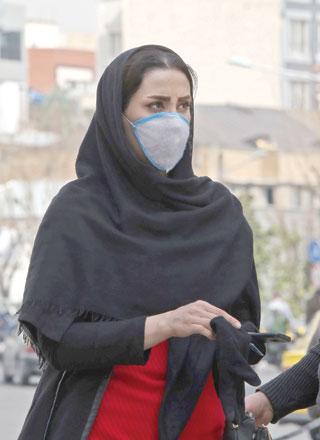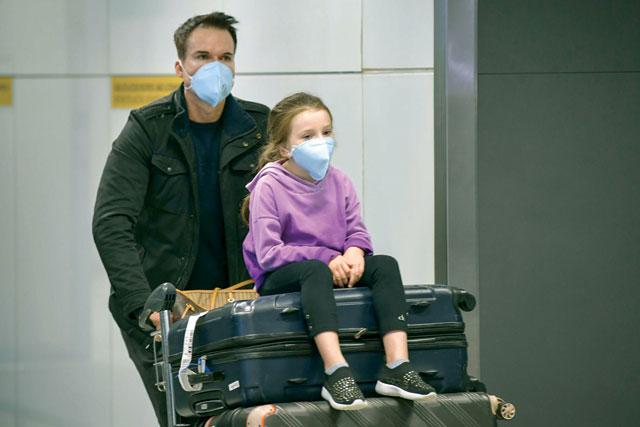You are here
WHO tells world to brace for 'potential pandemic' as coronavirus spreads
By AFP - Feb 24,2020 - Last updated at Feb 24,2020

A woman wears a protective mask while standing along the side of a street in the Iranian capital Tehran on Monday (AFP photo)
BEIJING — The World Health Organisation warned countries on Monday to be ready for a "potential pandemic" as new deaths and infections in Europe, the Middle East and Asia triggered more drastic efforts to contain the new coronavirus.
The number of fatalities in China — where the virus emerged late last year — also continued to soar, with 150 more deaths taking the official toll to nearly 2,600.
Chinese authorities insist they are containing the virus, citing slowing infection rates, thanks to unprecedented lockdowns and quarantines in or near the outbreak's epicentre.
But the spread of the virus in other parts of the world has accelerated over the past week, with Iran, South Korea and Italy emerging as new hotspots.
Deaths were reported in each of those countries on Monday, while Afghanistan, Bahrain, Iraq, Kuwait and Oman also announced their first cases of the virus.
WHO chief Tedros Adhanom Ghebreyesus said countries should be "doing everything they can to prepare for a potential pandemic", though the world body does not consider it has reached that point yet.
"The sudden increase of cases in Italy, the Islamic Republic of Iran and the Republic of Korea are deeply concerning," Tedros told reporters in Geneva.
Another WHO official said the virus could be around “for months”.
The wave of bad news sent global stock markets and oil prices tumbling as investors headed for safe-haven gold.
Authorities ramped up efforts to contain the spread of the virus, seeking to seal off borders and ordering people to stay indoors to stop them travelling.
But experts warned the virus, officially named COVID-19, was likely to easily spread in a similar manner to common seasonal flu.
“It seems that the virus can pass from person to person without symptoms, making it extremely difficult to track, regardless of what health authorities do,” said Simon Clarke, cellular microbiology associate professor at Reading University in Britain.
Cover-up allegations
In Iran, the confirmed death toll climbed on Monday by four to 12 — the highest number for any country outside China.
There were also concerns the situation in Iran may be worse than officially acknowledged, with the semi-official ILNA news agency quoting a local lawmaker in hard-hit Qom as saying 50 people had died there.
The Iranian government denied the report, and pledged transparency.
Even so, authorities have only reported 64 infections in Iran, an unusually small number that would mean an extremely high mortality rate.
In China, 2,592 people have died out of 77,000 infections.
South Korea has also seen a rapid rise in infections since a cluster sprouted in a religious sect in the southern city of Daegu last week.
More than 200 infections and two more deaths were reported in South Korea on Monday, bringing the total cases to more than 830 — by far the most outside China.
Eight people have died from the virus there, and President Moon Jae-in over the weekend raised the country’s virus alert to the highest “red” level.
As part of the containment efforts, school holidays were extended nationally while the 2.5 million people of Daegu were told to remain indoors.
Authorities in Hong Kong announced that from Tuesday it would not allow arrivals from South Korea other than returning residents.
Mongolia earlier announced it would not allow flights from South Korea to land.
Football, fashion curbed
Fears were also growing in Europe, with Italy reporting two more deaths on Monday, bringing the total to five.
More than 200 people have been infected there, and several Serie A football games were postponed over the weekend.
The famed Venice Carnival was also cut short, and some Milan Fashion Week runway shows were cancelled.
More than 50,000 people in about a dozen northern Italian towns have been told to stay home, and police set up checkpoints to enforce a blockade.
Prime Minister Giuseppe Conte has said that residents could face weeks of lockdown.
Economic toll
The virus is taking an increasingly heavy toll on the global economy, with many factories in China closed or subdued due to the quarantines.
The International Monetary Fund warned Sunday that the epidemic was putting a “fragile” global economic recovery at risk, while the White House said the shutdowns in China will have an impact on the United States.
China’s agenda-setting annual parliament meeting was on Monday postponed for the first time since the Cultural Revolution in the 1960s.
Bruce Aylward, leader of a joint WHO-China mission of experts, praised China’s containment measures, telling reporters in Beijing they had likely prevented hundreds of thousands of infections, but it was time to start lifting some of the restrictions.
“Obviously they want to get society back to a more normal semblance of what probably is the new normal, because this virus may be around... for months,” Aylward said.
Related Articles
GENEVA — There are now more new cases of the coronavirus reported each day outside China than inside the hardest-hit country, the World Heal
BEIJING — The number of cases from the new coronavirus topped 100,000 worldwide as official data Saturday showed a significant hit to Chines
GENEVA — The new coronavirus epidemic is at a "decisive point" globally, the World Health Organisation said Thursday, warning it could "get













